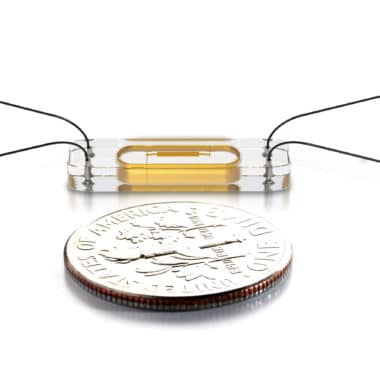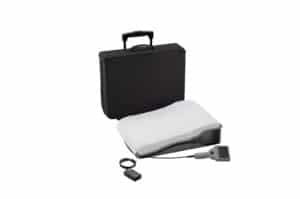Dealing With Fluid Buildup in Heart Failure

In some heart failure cases, there is frequently an accumulation of fluid in the body because the heart is not pumping effectively. When this happens, body fluids back up (or congests) into the legs, lungs, liver, or head. We use a diuretic medication such as Furosemide, Torsemide, or Bumex to cause urination to get rid of the fluid. The fluid buildup causes an increase in pressure in the system. If untreated, the fluid buildup often causes rehospitalizations. An implantable device called the CardioMEMS can measure the internal body fluid and decide how much diuretic one needs and deliver that information to your physician.
The CardioMEMS device is a pressure-sensitive device developed by the Department of Defense for use in weaponry. In medicine, it is used to determine fluid status. It is implanted during a Right Heart Cath through a femoral approach in the pulmonary artery and stays there indefinitely. It is ‘recharged’ by the turbulence of the blood flow. CardioMEMS stands for cardiac miniature electronic system.
 A CardioMEMS patient lies on a unique “pillow” that gathers information on body fluid. Once per day and the CardioMEMS inside the patient communicates with electronics in the pillow. The pillow then transmits the data to our office via an internet connection. This data includes the fluid pressure of the liquid (blood) in the arterial system. The whole transmission takes about five minutes from the time the patient gets on the pillow to the time it is received in our office. We check the CardioMEMS website twice per week for a trend in pressure. If the trend is upwards consistently over four to five days, then we call the patient to ask about signs and symptoms of fluid retention: swelling, shortness of breath, weight gain. If we feel a diuretic adjustment is warranted, then we increase the diuretic dosage. The same goes for a downward trend: if we see a consistent trend downwards, then the patient is called, and a diuretic dosage reduction may be indicated. We see changes in the CardioMEMS trend three to four weeks before the patient will see a shift in weight, edema, or breathing. The intent is to stop Emergency Room visits before signs and symptoms occur. If a patient presents to the Emergency Room with Heart Failure symptoms, there is a 98% they will be admitted. And with each hospitalization with Heart Failure, his chances of survival go down 30%.
A CardioMEMS patient lies on a unique “pillow” that gathers information on body fluid. Once per day and the CardioMEMS inside the patient communicates with electronics in the pillow. The pillow then transmits the data to our office via an internet connection. This data includes the fluid pressure of the liquid (blood) in the arterial system. The whole transmission takes about five minutes from the time the patient gets on the pillow to the time it is received in our office. We check the CardioMEMS website twice per week for a trend in pressure. If the trend is upwards consistently over four to five days, then we call the patient to ask about signs and symptoms of fluid retention: swelling, shortness of breath, weight gain. If we feel a diuretic adjustment is warranted, then we increase the diuretic dosage. The same goes for a downward trend: if we see a consistent trend downwards, then the patient is called, and a diuretic dosage reduction may be indicated. We see changes in the CardioMEMS trend three to four weeks before the patient will see a shift in weight, edema, or breathing. The intent is to stop Emergency Room visits before signs and symptoms occur. If a patient presents to the Emergency Room with Heart Failure symptoms, there is a 98% they will be admitted. And with each hospitalization with Heart Failure, his chances of survival go down 30%.
All patients admitted to the South Denver Transitional Heart Failure Clinic (THFC) are screened for the potential need of the CardioMEMS device. The patient screenings that qualify are sent to research for determination in the ‘Guide Research’ trial. At the date of this blog, there are five patients in this trial. After one year in the research study, the patient comes over to the commercial side and is monitored by the specialty registered nurses in the THFC. If the patient is interested in a CardioMEMS device but not in the research study, then we pursue the commercial side for an implant. With this unique device, we have seen a significant drop in hospitalizations. Having a CardioMEMS device is a time commitment for the patient that will involve checking blood pressure, heart rate, and weight daily. CaroioMEMS is not for everyone, some patients have dropped out due to compliance issues, but most patients who start are committed to continuing. Our first implant was in 2015. We have inactivated nine patient devices for various reasons, mostly due to moving to a different locale. Most patients who have continued find it a good indicator of fluid status and feel it is beneficial.
To learn more about CardioMEMS, visit www.merlin.net
and to learn more about the THFC visit: www.SouthDenver.com/THFC
Thanks to Vicki Petts, BSN, RN, for writing this blog. Vicki is a heart failure nurse specialist and has been a nurse for over 44 years.
- Can I Shovel Snow with a Heart Condition? - March 18, 2024
- 6 Tips for Resuming Outdoor Exercise this Spring - March 11, 2024
- Early Signs of Heart Disease - February 26, 2024
Sign Up
As with any health concerns, your specific treatment program should be discussed thoroughly with your primary care physician as well as any specialists who may need to be consulted – like a cardiologist.
Sign Up
